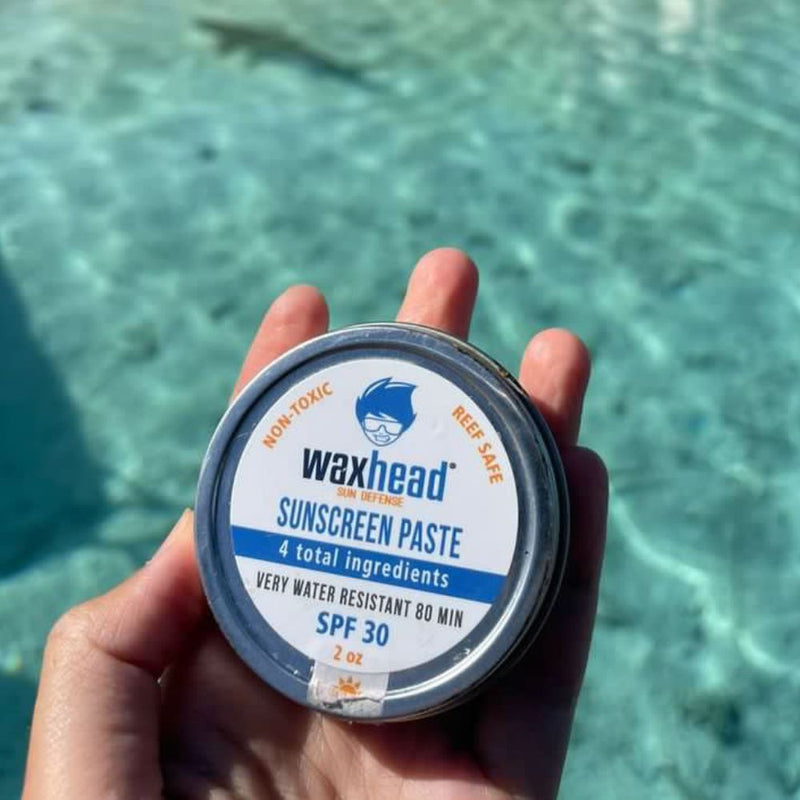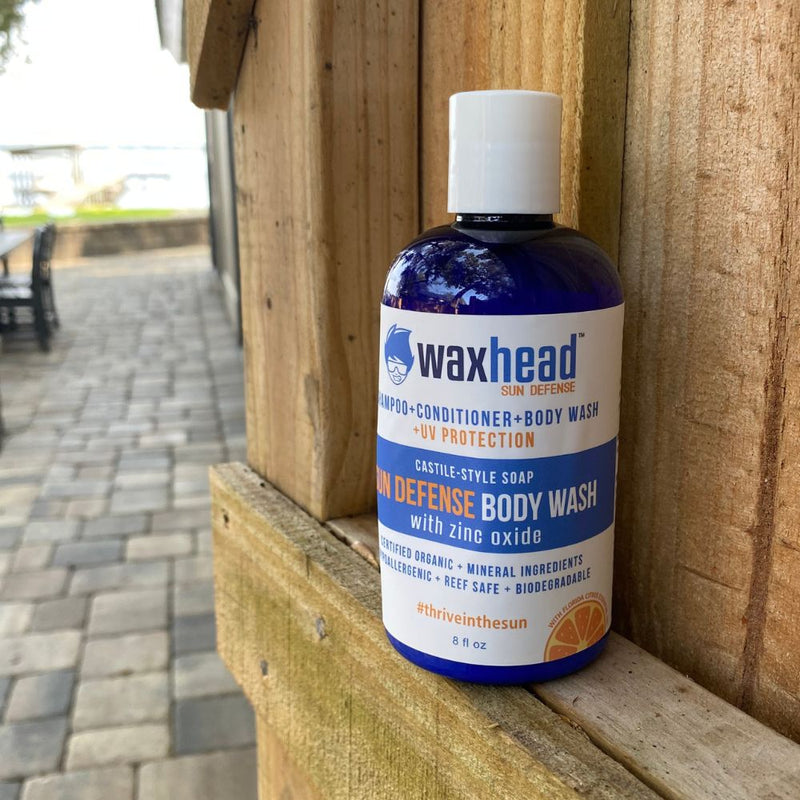Vitamin E Benefits
We started our Waxhead mission as a way to protect our skin in the sun. And just like water-soluble Vitamin C, its fat-soluble Vitamin E partner became a vital ingredient in our nutrient bars. Quite simply, Vitamin E benefits and defends your skin in the sun, and it’s so much more, doing good things for many of our body’s systems.
Vitamin E is Free-radical Fighter
Inside the body, oxygen becomes reactive through certain molecules, causing damage via free radicals. This is known as oxidative stress, which has the potential to deconstruct and damage DNA. Vitamin E counters this stress by protecting lipids (the building blocks of cell membranes and other biochemical structures) from free radical damage and oxidation.
Vitamin E is Multipurpose Defender
Like Vitamin C, Vitamin E is a great multipurpose health defender. Best known as an antioxidant, it offers a big range of health benefits, protecting against cell damage and infection, boosting immune system response, sustaining healthy blood flow, and protecting against heart problems and cancer.
Few of us get enough E
In short, Vitamin E brings an a big box of tools to the body-health, disease-fighter table. But very few of us get nearly enough, even those eating otherwise healthy diets, since many commercially available E-rich vegetables have much less than their more natural, farm-to-table counterparts.
In fact, while the US government recommends daily intake of 15 IU (10 mg) per day, most get less than 70% of that. And to get most of the REALLY big benefits of Vitamin E, daily intake should be more along the lines of 225-450 IU (150-300 mg). In realistic terms, these levels can’t be approached without supplements, because E just isn’t abundant enough in practically all our foods.
A couple of things to consider
Three things to note about the info below. First, you’ll see use of IU (international units) and mg (milligrams). Their conversion is a bit complex, depending on respective substances, but with Vitamin E, 3 IU convert to 2 mg. Second, by Vitamin E, we mean in particular the substance d-alpha-tocopherol (succinate) as opposed to dl-alpha-tocopherol acetate. These might look pretty much the same, but they’re not. (The differences could take up one whole article, and while the latter is also a viable option, many believe the former, which is what we use in our bars, is more effective.) Finally, note that Vitamin E is even more powerful when used together with Vitamin C. Again, the relationship is complex, but in simple terms, they help each other and they work in different areas, being soluble by fat (E) and water (C). So when you read how Vitamin E does this or that, you can feel pretty confident that including Vitamin C is only going to help more.
And without further lead in, read on to get a better idea of the range of Vitamin E’s benefits to your health.

Use Zinc Oxide Sunscreen
Our travel-friendly, pocket size field tins contain the thickest, toughest, healthiest, eco-friendliest sunscreen you'll find.
Stays on face to defend and nourish skin through through saltwater, pool water and sweat.
VIEW PRODUCT DETAILS
1. Vitamin E is an Antioxidant
Our modern world produces a lot of stuff that’s bad for our body and its otherwise healthy cells. Air and water pollution, chemicals and toxins, not to mention the sun’s UV rays. All add to the production of free radicals in our body and skin, and too many free radicals lead to a host of health problems, including cancer. We have some natural antioxidants to fight this, but not nearly enough to maintain long term health. Our bodies, made for active lifestyles in the sun, were simply not designed for our first-world high-fat, high-sugar, high-carb diets and low activity levels. So we need to supplement with man-made antioxidants such as Vitamin E.
Surprisingly, this can also be true for people who eat healthy diets, as many of our modern, industrially farmed vegetables are harvested while their nutrients are far from maximum development. In other words, those foods don’t supply nearly as much nutrients as their more natural, farm-to-table counterparts, and depending solely on them to supply nutrients like Vitamin E leaves a significant shortage for our modern lifestyles.
Research shows a clear, broad role of Vitamin E in health. It defends the body from cell damage leading to cancer, heart disease and a myriad of chronic problems. It boosts immunity by increasing the production of cells that kill germs and cancer cells. It also increases the cells that make antibodies to fight specific germs.
Many medical experts recommend daily dosages of 150-300 mg (225-450 IU) of Vitamin E. Most people don’t get much more than 15 IU a day from green leafy vegetables, vegetable oils, avocados, nuts and seeds, typical sources of the vitamin.
“Vitamin E can work from the inside out. As an oral supplement, it can significantly reduce inflammation and skin damage caused by sun exposure.” - Karen E. Burke MD PhD
2. Protect against Skin Damage & Skin Cancer
Research shows that vitamin E protects the skin from sun damage and skin cancer, and it can reverse some of the discoloration and wrinkles associated with aging. Vitamin E works by boosting skin’s natural repair systems, directly inhibiting further harm. says Karen E. Burke, MD, PhD, of the Mount Sinai School of Medicine’s department of dermatology.
Dr. Karen Burke recommends taking daily supplements containing 400 IU of Vitamin E (and 1,000-3,000 mg of Vitamin C).
3. Repair Sunburn Damage
Before learning how nutrients defend from sun damage, it helps to understand how such damage is caused. Sunlight produces two types of ultraviolet rays: UVA and UVB. The primary contributor to sunburn and short term skin damage, UVB rays are high intensity rays absorbed at the skin’s surface. Lower intensity UVA rays penetrate deeper, factoring in longer term damage like premature wrinkles and skin cancer.
Both work by producing free radicals, which are unstable molecules that steal electrons from healthy molecules to stabilize themselves. Free radicals are created by lots of regular metabolic functions, but sun exposure produces many more. Your body’s natural free radical defenses often aren’t enough to prevent UVA and UVB damage effectively. They either need to be boosted, with intake of antioxidants, or supplemented with sunscreen.
Many sunscreens block primarily UVB rays, and those that block UVA rays do allow some exposure. The best sunscreens are labeled for broad-spectrum coverage and contain the ingredients oxybenzone and methoxycinnamate, which help with UVA absorption. In a practical sense, only clothing and zinc oxide block UVB and UVA rays completely.
To boost the body’s natural sun defenses, significant intake of antioxidants neutralize free radicals, including those created by sun exposure, by offering them electrons, sparing healthy molecules from harm. These include Vitamin E (and C) and the mineral selenium. Sun exposure tends to deplete your skin’s supply of these antioxidants, so regular, significant intake is recommended while in the sun.
Vitamin E works from the inside out. Consumed orally, it reduces inflammation and skin damage caused by sun exposure. After getting significantly exposed to sun, take a lot of Vitamin E, 3-5 doses of 400 IU per day, for one to two days. And for optimum ongoing protection, many doctors recommend taking 400 IU (267 mg) of Vitamin E daily, in the form of d-alpha-tocopherol.
“No one is proposing that vitamins will ever replace sunscreen, but they can make sunscreen better. It would also be nice to replace some of the chemicals in sunscreen with vitamins.” - Dr. Douglas Darr, Ph.D – North Carolina Biotechnology Center
4. Reduce risk of Heart Disease
Doctors have long warned of the risks contributing to heart disease: smoking, high-cholesterol and high-fat diets, high stress, and too little exercise. Now they’re starting to appreciate specific nutrients, particularly Vitamin E, Vitamin C and beta-carotene, as just as important. In fact, it may be that a lack in such nutrients can actually lead to heart disease.
Vitamin E plays an important role in preventing heart disease. A Harvard University study discovered that men taking 100 IU of Vitamin E per day for 2 or more years reduced risk of heart disease by 40%. Another study compared diets of 73,000 nurses and determined an E-rich diet reduced heart attack risk by 52%.
In lab studies, Vitamin E and Vitamin C prevent LDL (the bad cholesterol) from becoming oxidized and increasing artery plaque. Vitamin E also helps eliminate or prevent blood clots by inhibiting platelets from sticking together or from attaching to blood vessel walls.
5. Heart Health
In addition to its artery clearing abilities, Vitamin E possesses antiviral and antioxidant properties that protect the heart from infection and toxins. Cardiologist Peter Langsjoen recommends 400 IU per day to glean such benefits effectively.
“Several studies have suggested that an increase in Vitamin E to a level of 100 IU or more a day is protective against heart disease. That level cannot be achieved by dietary means, so you have to supplement.” - Dr. Balz Frei, PhD, Boston University
6. Protect against Artery Plaque
Vitamin E has likely the most prominent role in slowing or stopping atherosclerosis plaque buildup, attaching to LDL particles when it forms in the liver and enters the blood. Once attached, Vitamin E prevents particle oxidization that would otherwise form artery plaque. Plentiful supply of Vitamin E keeps such LDL harmless. Also note that Vitamin C helps regenerate Vitamin E when supply is low.
Harvard School of Public Health researchers studied 40,000 men who took at least 100 IU of Vitamin E a day for at least 2 years, and found they reduced heart disease risk by 37%.
The recommended daily value for Vitamin E is only 20 IU, but doctors who recommend Vitamin E supplements call for 100 IU or more a day. Up to 600 IU daily is a safe dose, according to medical experts, although people taking anticoagulants should not take Vitamin E supplements.
7. Heal Hearts after Surgery
Oxygenated blood circulating in an oxygen-deprived heart allows free radicals to injure heart cells. For those who’ve had bypass surgery, Vitamin E helps with long term healing and health. University of Southern California scientists found that men consuming at least 100 IU of Vitamin E daily experienced significantly slower post-op plaque buildup. Additionally, researchers at the University of Toronto have found evidence that Vitamin E helps decrease tissue damage during coronary bypass surgery.
“Like Vitamin C, Vitamin E has the ability to protect biological molecules from the kind of chemically induced damage that can lead to cancer. Because it is fat-soluble itself, Vitamin E is particularly good at protecting fatty cell membranes from oxidative damage.” - Dr. Balz Frei, PhD, Boston University
8. Protect against Cancer Risk
Animal studies repeatedly show Vitamin E helps prevent the cell damage that develops into cancer. National Cancer Institute researchers found that those who used Vitamin E supplements cut the risk of oral cancer in half. And British scientists discovered that women high in Vitamin E levels reduced risk of breast cancer by a whopping 80%. Based on such evidence, many experts see Vitamin E as a possible vital factor in cancer prevention.
Many such experts recommend a Vitamin E supplement of 400-600 IU daily. Since even the healthiest diets fail to supply this level, supplementation is a must.
9. Fighting Osteoarthritis Inflammation
Vitamin E neutralizes the biochemicals produced during inflammation, which helps slow or stop the inflammation cycle. The immune system actually produces such biochemicals, which contain free radicals. And as an excellent antioxidant, Vitamin E is a big player in the fight against ongoing inflammation.
Research has shown that osteoarthritis sufferers supplementing with 600 IU of Vitamin E daily for 10 days enjoyed sizable pain reductions compared to when they were NOT taking Vitamin E.
Doctors recommend daily Vitamin E supplements of 400-600 IU to help osteoarthritis symptoms. The mineral Selenium boosts Vitamin E effectiveness, and it is often added to the osteoarthritis treatments, usually 200 mg per day. Doctors who recommend Vitamin E generally suggest 400 IU a day to fight such joint inflammation.
10. Fighting Rheumatoid Arthritis Inflammation
Vitamin E neutralized free radicals which eases joint inflammation, and so many doctors include Vitamin E supplements in their treatments for rheumatoid arthritis.
Researchers in Japan compared lab animals with Vitamin E deficiencies to those given large dosages of Vitamin E. After being given toxins to produce rheumatoid-like joint damage, those deficient in Vitamin E had significantly more biochemical markers of inflammation in their blood.
11. Reduce Leg Cramps
Vitamin E benefits and supports blood flow in legs, since it can improve intermittent claudication (a condition in which cramping pain in the leg is induced by exercise), typically caused by artery clogging. While reduced blood flow stops oxygen from reaching muscles effectively, Vitamin E helps utilize the limited oxygen more efficiently. And just as vitally, Vitamin E helps prevent blood clots in the first place.
Dr. Donald Carrow illustrates. “If I cut my finger and hold it in front of me, blood will stop pumping out of it before I die from loss of blood. It’s an inherent, built-in safety mechanism.” But this necessary ability causes issues once fatty deposits (plaque) build along the artery walls in the leg, as blood cells rush to spots of buildup (sense the body “senses” an injury), forming clots that further decrease blood flow. “By making your blood cells less able to stick together, Vitamin E helps maintain adequate blood flow and can reverse some damage,” continues Dr. Carrow.
In order to defend against claudication, Dr. Carrow and other doctors advise daily intake between 400 and as much as 4,000 IU of Vitamin E, taken in separate doses throughout the day. Since Vitamin E is fat soluble (excess is not easily passed out of the body), please check with your doctor before taking over 600 IU of Vitamin E a day.
12. Ease Diabetes
Those with diabetes have a risk of heart disease that’s 2-4 times normal, so Vitamin E is even more important for their heart health.
This higher risk is mostly due to free radical damage in blood-based fats, explains Sushil Jain, PhD, Louisiana State University Medical Center. This is called lipid per oxidation and causes clogging in capillaries, reduced life span of red blood cells, and platelet aggregation, where blood cells stick together more readily.
“People with diabetes may need more antioxidant protection than is available in a normal diet,” says Dr. Jain. He found in his research that diabetes patients taking daily Vitamin E supplements of 100 IU lowered blood levels of triglycerides (blood fats made of sugar) by 25-30%, and they also reduced the tendency for sugar to stick to blood proteins.
“Antioxidants work by boosting your immune system ahead of time and preventing disease from getting a foothold in the first place.” - Kristy Russ, BSc Pharm

Zinc Oxide Stick Sunscreen
A little goes a long way and stays on to defend through saltwater, sweat and surf.
25% zinc oxides protects your skin with true broad spectrum coverage.
VIEW PRODUCT DETAILS
13. Strengthen Immunity
Scientific research has long shown that Vitamin E supplements tend to boost power of the immune system, including increased production of interferon and interleukin, two biochemicals the immune system makes to fight infection.
And by controlling oxidative damage, Vitamin E helps maintain healthy immune response. Paradoxically, the immune system creates free radicals as a byproduct of destroying viruses, bacteria and other foreign invaders, and Vitamin E’s role as an antioxidant fits nicely with healthy immune system activity.
Experts typically recommend daily Vitamin E dosage of 400 IU to boost the immune system effectively.
14. Healing Burns
As we know, Vitamin E is an excellent free radical fighter. Burns cause a relative explosion of free radical production, and so Vitamin E is a crucial part of burn healing therapy. In fact, free radical activity is so high after a serious burn that the body’s antioxidant supply is almost completely depleted, giving free radicals free rein.
Minor burns warrant a Vitamin E supplement to reach 30 IU daily. For extra protection again scarring, Vitamin E should be applied topically to the burn area. For 3rd degree and other serious burns, many doctors recommend 800-1,600 mg per day. Because Vitamin E is fat soluble (unable to pass quickly out of the body), consult a qualified medical professional before taking this level of dosage.
“Vitamin E is a powerful antioxidant. There’s reason to believe that combined with other nutrients, it may help slow the progress of lends clouding.” - Dr. Randall Olson, MD
15. Eye Protection: Cataracts
Research shows Vitamin E, as a powerful antioxidant, helps protect the eye lens from oxidative damage, which is produced by exposure to light, as well as significant intake of sugar and cigarette smoke.
In one study, those taking daily Vitamin E doses of 400 IU lowered their risk of developing cataracts by half, compared with those without the dosage.
Doctors recommend 400 IU of Vitamin E a day to protect eyes.
16. Preventing Macular Degeneration
The retina contains something called the macula, which is made up of cells that feed the brain with images captured by the lens. Acting in this capacity, it received the most focused light of any part of the eye. Over time, light reacts with oxygen and may damage the retina’s cells, leading to increased growth of retina blood vessels, which can then leak, swell and scar. Known as macular degeneration, this process can mar sight progressively and permanently. Except for cataracts, it’s the leading cause of blindness in people older than 50.
However, with it antioxidant abilities, Vitamin E helps limit light-oxygen interactions that drive the degenerative process.
Scientists at Johns Hopkins University School of Medicine found that people with high levels of Vitamin E lowered by 50% the risk of developing macular degeneration, compared to those with lower blood levels.
17. Cool down Hot Flashes
A hot flash (sudden, intense hot feeling in the face and neck) is caused by hormonal surges, and usually lasts about 3-10 minutes. About 80% of women experiencing menopause have them.
Besides hormone replacement therapy, daily Vitamin E supplements may offer relief with less side effects. This is because Vitamin E acts as a proxy for estrogen, and multiple studies have shown it ability to relieve hot flashes, night sweats and mood swings.
To curb hot flashes, some doctors recommend daily doses of 800 IU. Please double check with your own medical professional team before going this route.
NEXT STEPS
1. Know your ingredients — Flip over your sunscreen and read the ingredients. We want everyone to know what good ingredients are, regardless of whether they use our products or not. Your health is worth it.
2. Buy safe sunscreen — Waxhead is dedicated to using only the healthiest, safest, most effective ingredients in our sunscreens. Shop Safe Sunscreen here.
3. Teach a friend — If you know someone who might still be buying sunscreen with questionable ingredients, please share this post with him/her.
Source Materials
Healing with Vitamins, J.W. Goethe University Medical School Dept of Dermatology, Journal of the American College of Nutrition, Arthritis Foundation, WedMD, Oregon State University, Life Extension, Organic Facts, The Role of Antioxidants in Skin Cancer Prevention and Treatment, Nutritional protection against skin damage from sunlight, Consumer Health Digest, Antioxidants.
Please talk to your medical team, including your doctor and a licensed nutrition, before making any changes to your diet.





























